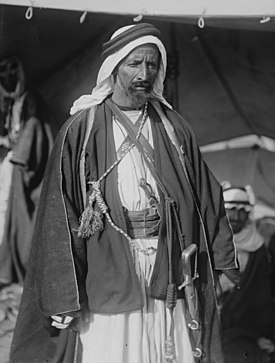Auda Abu-Tayeh عودة أبو تايه | |
|---|---|
 | |
| Born | 11 January 1874 Hejaz Vilayet, Ottoman Empire |
| Died | 27 December 1924 (aged 50) Amman, Emirate of Transjordan |
| Allegiance | |
| Service | Huwaytat |
| Battles / wars | Arab Revolt |
| Relations | Mohammed al-Dheilan (cousin) Ibn Zaal (nephew) |
Auda Abu Tayeh or Awda Abu Tayih (Arabic: عودة أبو تايه 11 January 1874 – 27 December 1924), nicknamed the Commander of the People or the Desert Falcon, was the Sheikh of a section of the Howeitat or Huwaytat tribe of Bedouin Arabs at the time of the Great Arab Revolt during the First World War. The Howeitat lived in what is now Saudi Arabia/Jordan.
Auda led the Arab forces in several battles, the most significant ones being the battle of Aqaba, where he managed to capture the city, seizing the entire Ottoman garrison and the siege of Damascus, when he took the city alongside Faisal.
He died in 1924 and was buried in Amman. He is considered a national hero in Jordan.
In the Arab world, he is seen as a generous and honorable man. However, outside of the Arab world, he is mainly known through his distorted portrayal in British Col. T. E. Lawrence's account Seven Pillars of Wisdom and from the fictionalised depiction of him in David Lean's film Lawrence of Arabia. Those accounts, which presented him as a greedy and slick man, were criticized by historians.